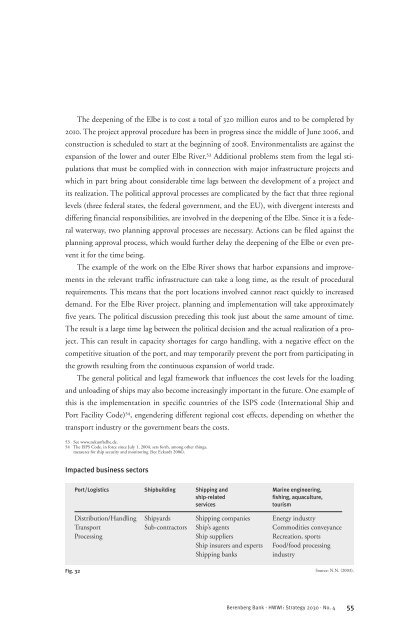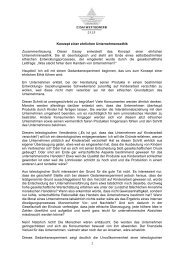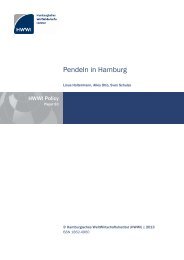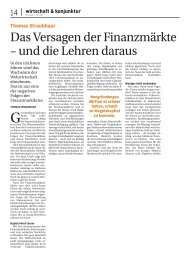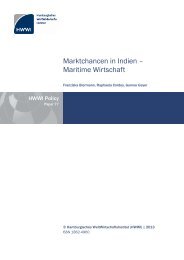Maritime Trade and Transport - HWWI
Maritime Trade and Transport - HWWI
Maritime Trade and Transport - HWWI
You also want an ePaper? Increase the reach of your titles
YUMPU automatically turns print PDFs into web optimized ePapers that Google loves.
The deepening of the Elbe is to cost a total of 320 million euros <strong>and</strong> to be completed by<br />
2010. The project approval procedure has been in progress since the middle of June 2006, <strong>and</strong><br />
construction is scheduled to start at the beginning of 2008. Environmentalists are against the<br />
expansion of the lower <strong>and</strong> outer Elbe River. 53 Additional problems stem from the legal sti -<br />
pulations that must be complied with in connection with major infrastructure projects <strong>and</strong><br />
which in part bring about considerable time lags between the development of a project <strong>and</strong><br />
its realization. The political approval processes are complicated by the fact that three regional<br />
levels (three federal states, the federal government, <strong>and</strong> the EU), with divergent interests <strong>and</strong><br />
differing financial responsibilities, are involved in the deepening of the Elbe. Since it is a federal<br />
waterway, two planning approval processes are necessary. Actions can be filed against the<br />
planning approval process, which would further delay the deepening of the Elbe or even prevent<br />
it for the time being.<br />
The example of the work on the Elbe River shows that harbor expansions <strong>and</strong> improvements<br />
in the relevant traffic infrastructure can take a long time, as the result of procedural<br />
requirements. This means that the port locations involved cannot react quickly to increased<br />
dem<strong>and</strong>. For the Elbe River project, planning <strong>and</strong> implementation will take approximately<br />
five years. The political discussion preceding this took just about the same amount of time.<br />
The result is a large time lag between the political decision <strong>and</strong> the actual realization of a project.<br />
This can result in capacity shortages for cargo h<strong>and</strong>ling, with a negative effect on the<br />
competitive situation of the port, <strong>and</strong> may temporarily prevent the port from participating in<br />
the growth resulting from the continuous expansion of world trade.<br />
The general political <strong>and</strong> legal framework that influences the cost levels for the loading<br />
<strong>and</strong> unloading of ships may also become increasingly important in the future. One example of<br />
this is the implementation in specific countries of the ISPS code (International Ship <strong>and</strong><br />
Port Facility Code) 54 , engendering different regional cost effects, depending on whether the<br />
transport industry or the government bears the costs.<br />
53 See www.zukunftelbe.de.<br />
54 The ISPS Code, in force since July 1, 2004, sets forth, among other things,<br />
measures for ship security <strong>and</strong> monitoring (See Eckardt 2006).<br />
Impacted business sectors<br />
Fig. 32<br />
Port/Logistics Shipbuilding Shipping <strong>and</strong> Marine engineering,<br />
ship-related fishing, aquaculture,<br />
services tourism<br />
Distribution/H<strong>and</strong>ling Shipyards Shipping companies Energy industry<br />
<strong>Transport</strong> Sub-contractors Ship’s agents Commodities conveyance<br />
Processing Ship suppliers Recreation, sports<br />
Ship insurers <strong>and</strong> experts Food/food processing<br />
Shipping banks industry<br />
Source: N.N. (2003).<br />
Berenberg Bank · <strong>HWWI</strong>: Strategy 2030 · No. 4<br />
55


